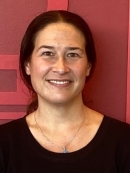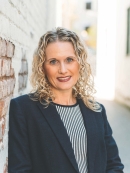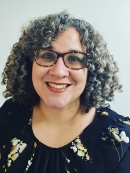
Multimedia Projects
Rutgers School of Social Work Doctor of Social Work (DSW) students create interactive multimedia projects (MMP) that synthesize their scholarship and make their work accessible and useful to a global audience.
Third-year students produce a dynamic, interactive multimedia project (MMP) that synthesizes their scholarship and makes their work accessible and useful to a global audience. Our graduates learn to use video, audio, data visualizations and other digital tools to advance human understanding, and to connect with and serve their chosen communities.
From the onset, the multimedia project is designed for the screen and for a readership that assumes that any important contemporary document is born digital. Successful graduates will be literate in the culture’s most powerful means of communication and conversant with the challenges that digital technology poses for young and old alike.

Stephanie M. Cedeño
Connections Beyond Borders: Working with Refugee and Unaccompanied Youth in Schools
This MMP will follow the journey of unaccompanied youth by discussing the three stages of migration, the risks, and protective factors throughout all stages. In addition, the unique migratory grief and loss experiences of refugee and unaccompanied youth will be discussed.

Angela DeCandia Vitoria
Not Just Me? Helping Women Recover from Post Infidelity Trauma
In this MMP, I will provide a brief overview of the literature supporting the conceptualization of infidelity as trauma.

Ashley Gwathney
Offsetting Racial Divides: Zero-Tolerance School Suspensions and Restorative Justice Practices
In this MMP, I will provide a brief overview of zero-tolerance school suspensions, the use of this practice, and disparities in race and gender. Case examples of "Elias" and "Thomas" will be presented to contextualize adolescent Black males' lived experiences and inequities of this approach

James S. Hart III
Strengthening Black-White Married Couples
This MMP will examine the specific challenges experienced by Black-White couples and the strategies they implement to maintain marital stability. Testimonies from Black-White couples along with a discussion of interventions will be offered for social workers providing marital and pre-marital services.

Micah Hillis
PEERS: A Model for the Provision of Quality to Peer Support Workers
In this MMP, the field of peer support is a rapidly expanding field in the helping professions. However, the provision of quality supervision to peer support workers (PSW) remains an unmet challenge. The struggle to adequately provide supervision often leads to a high turnover rate among programs that employ the evidence-based practice of peer support.

Joan Hogan
The TransParent Journey
This MMP describes the many emotions experienced by families, including the three Gs described as the grief, the guilt, and the gift, presented in personal interview narratives. Transgender history, acceptable language, current statistics on violence and suicide, top questions to prepare clinicians, best practice guidelines, and the benefits of advocacy will also be explored, as will resources to help guide families.

Bushra Husain
Forced Marriage in the United States
This MMP will share aspects of my exploratory research with forced marriage survivors who were interviewed to examine the survivor’s family history and how it facilitated or hindered their ability to leave the marriage. These findings inform current projects aimed to expand clinical, legal, and policy supports for forced marriage survivors.

Tangela C. Sawyerr
In this MMP, of all forms of familial loss, siblings are the least studied. When a death occurs, siblings are often ignored because the focus is directed toward parents, spouses, and surviving children. This invalidation can negatively impact the grief responses of adult siblings and cause short and long-term consequences.

Alison B. Wetmur
Raising Deaf Children: A Resource Guide for Parents. In this MMP, ninety to ninety-five percent of d/Deaf children are born to hearing-abled parents, and these children are often the first d/Deaf person their parents meet. Many hearing-abled parents opt to use spoken and heard/lipread language with their d/Deaf child. Despite significant technological advances, oral and aural communication is often frustrating or inaccessible to d/Deaf people.

Jennifer Agostino
Helping Teachers Recognize Trauma Symptoms and Manage Dysregulation
In this MMP, I will identify behavioral reactions of children with trauma histories, and present interventions, helpful for any dysregulated child, including those without trauma. Children with trauma histories often display behaviors of hyperactivity, aggression, or inattention. However, they may, more accurately, be having a trauma response.

Allison Bates
Foodways, Social Identity, and Health
This MMP will examine the impact of African foodways and their connection to social identity and health in the Black community. Food choices have and continue to be a way for Blacks to maintain a sense of social identity, and they can evoke feelings of nostalgia and pride.

Micaela Costa
Thinking About Getting Your Doctor of Social Work Degree (DSW)?
This MMP will examine the history behind the DSW. Learn when the degree was first conferred and the ebbs and flows of the degree’s prominence over time. Examine the current state of the DSW and the emergence of programs. Discover information about the various programs offered across the country
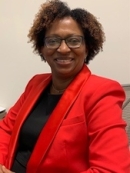
Mariama Diallo
Best Practices in Responding to FGM/C Cases in the United States
In this MMP, Female Genital Mutilation/Cutting (FGM/C) is often thought of as an isolated cultural practice occurring only outside of the U.S. In reality, FGM/C is a growing problem in the U.S. and many girls are at risk. Recent statistics have shown that 513,000 girls and women in the United States today have either undergone or are at risk of FGM/C (Goldberg, et al., 2016).

Alexandra (Lexi) Greenberg
Treating Veterans Who Have Committed Sex Offenses: Approaches for General Outpatient Settings
This MMP will increase participants' awareness of the needs of this population and provide assessment and treatment strategies. In the United States, Veterans are over-represented among adults incarcerated for sex offenses. After incarceration, these Veterans present to Veterans Affairs hospitals with unique clinical needs.

Kira O'Brien
Emerging Adults, Emerging Activists: A College Activism Retrospective and Practitioners Guide
This MMP is a portal into the lives of students and professionals who are all grappling with the concept of activism.

Kayti Protos
Advocating for Gender Diverse Clients with Eating Disorders as Cisgender Providers
This MMP will prepare cisgender providers to advocate on behalf of gender diverse clients with eating disorders. Discussion will focus on key terminology, factors contributing to eating disorder development in this population, and advocacy tips accessible to providers of varying skill levels.

Tara Ryan-DeDominicis
Unlocking Homelessness in the Classroom
In this MMP, homelessness is an experience that can impact anyone. No matter their age, race, background, or ability, individuals and families can get caught in a cycle of poverty and homelessness. Despite a growing need of qualified helping professionals to engage with this community, few social work classes at any level devote much time or attention to this issue

Sherri Wilson
Working Autism, Visualizing Employment
This MMP will reveal how using a strengths-based approach is effective in addressing barriers faced by individuals with Autism Spectrum Disorder (ASD). The goal of this presentation is to show how individuals with ASD can live more fulfilling lives if given the opportunity to utilize their strengths.

Christine Caporuscio
Digital Life: Helping Teens Navigate a Digital World
In this MMP, adolescents are developing while constantly exposed to technology, using various platforms both academically and socially.

Deborah Dumont
College & Beyond: How Parents Can Impact Success
In this MMP, Identify ways mental health providers can assist emerging adults and their families as they enter this new stage development. Identify possible reasons why college counseling centers are noticing a significant increase in severe symptomatology and in the demand for mental health services.

Michael Garbe
How Social Workers Assess and Treat Clients Undergoing a Spiritually
This MMP discusses the findings of a small, exploratory qualitative study of licensed social workers, who work with individuals who have undergone a spiritually transformative experience (STE).

Dunia Garcia
You Can Go to College; Increasing Persistence Through Access
In this MMP, I will describe the challenges and barriers to college completion for students of color, and present factors and key access points that can increase persistence.

Helena D. Lewis
Reentry, Grief and Loss: Addressing Unmet Mental Health Needs of Women Offenders
In this MMP, experiencing the loss of a loved one under any circumstances can be challenging. For women who are incarcerated the outward expression of grief and emotion is often suppressed due to fear of receiving sanctions and being placed in restrictive housing.

Karie McGuire
Sex Trafficking in the USA: Voices from Here at Home in New Jersey
In this MMP I will illustrate how helping professionals can effectively engage and advocate for DMST victims at the early stages of identification and also foster a safe, accepting therapeutic space to assist these clients in trust building and identify formation.
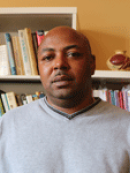
Asa Paris
Unsung Losses: Combating Suicide in Military Populations
In this MMP, I will describe the combination of risk factors and challenges to help-seeking behavior of military members.

Jennifer Polizotto
School Social Workers: Operating at the Intersection of Education and Mental Health
In this MMP, I will provide an overview of the integration of mental health services within the education system, the prevalence of current mental health challenges affecting students.

Lauren Snedeker
A Social Work Response to a Multigenerational Work Place: Taking A.C.T.I.O.N Against Ageism
In this MMP, I describe the complex experiences the aging workforce is living through today. Assess for the continued ways the aging workforce can contribute, such as through reverse mentorship opportunities, thereby lessening the existence of age discrimination in the workplace.

Jamie Wasserman
Exploring Unwanted Consensual Sex: A Qualitative Pilot Study
In this MMP, consenting to sex is a complicated psychological, political, and social issue. Because the legal system does not classify consensual sex as rape, there is a mistaken assumption that consent is an either/or issue

Kelly Zinn
Supporting Students Living in Out-of-Home Placements
In this MMP, students living in out-of-home placements, such as foster or kinship care, are at-risk for academic challenges.

Kim Jordan-Casarona
Positive Psychology for Families
I present some of the core concepts of Positive Psychology and the research behind these concepts.

Gila Cohen Davidovsky
Cultural Sensitivity with Orthodox Jews in Therapy
This MMP will highlight therapeutic issues arising in therapy with Orthodox Jews.

Katherine DeVito
Creating a Safe Haven: Gang Prevention in Schools
This MMP presents an overview of gang prevention in schools, including the risk and protective factors, warning signs, major gang breakdowns, leaving a gang, gangs as family, and possible components of gang prevention programs in schools.

Alexis Dragun
Recognizing Student Trauma: A Trauma Informed Guide for School Staff
In this MMP, I will define trauma and adverse childhood experiences (ACEs), and describe how these experiences negatively affect the brain and behavior.

Alba Lopez
Discussing Challenges in Housing Women Veterans Who Are Single Parents
I present an overview of the challenges facing homeless women Veterans who are single parents.

Phil Miller
Internship: High-Impact Experiential Learning
In this MMP, I present research on what makes an internship a high-impact learning experience. I emphasize the technique of reflection by utilizing the concept of Reflection-in-Action.

Bridget Nash
Demystify the Mental Health System and the Therapeutic Process
My MMP serves as a portal for consumers to access information about therapy and treatment within the mental health system. Podcasts will be used to share knowledge from experts in the field of therapy and treatment.

Kanako Okuda
Understanding Field Placement Anxiety: Embracing Vulnerability as a Learning Tool
I introduce the concept of field education anxiety, with a particular emphasis on social work students’ field learning processes.

Gwilym Roddick
Psychotherapy for Anxiety & Addictions
In this MMP, I present an overview of the current and most prevalent methods to aide clients with Substance Use Disorders (SUD’s) in the US, with a special emphasis on both the positive attributes and the significant gaps in these services

Roxanne Ruiz-Adams
Undocumented and Ill: Navigating Cancer, Treatment, and Trauma
This MMP presents an overview of the challenges experienced by undocumented migrants in the medical system. I will introduce the concept of trauma-informed practice, and assert the need for trauma-informed medical care when working with undocumented migrants.

Kimberly Waibogha
The Opioid Crisis: What Is It? How Did It Happen? Where Do We Go From Here?
In the United States, 2.1 million people have an opioid use disorder (HHS, 2018). In 2017, there were 28,466 deaths linked to the use of opioids (HHS, 2017).

Robin Wiley
The Experience of Aging: Exploring, Understanding, and Supporting
This MMP will explore the experience of aging as reported by the testimonies of older adults.

Emily Zimmerman
Trauma-Informed Infertility Treatment
I will present a call for trauma-informed care within the field of reproductive endocrinology. I will present an overview of SAMHSA’s six principles of trauma-informed care with an emphasis on considerations that are particularly relevant to working with women in infertility and reproductive endocrinology settings.

Zakia Clay
Transitioning to Community Support Services (CSS)
The focus of this multi-media project is to examine the role of fee-for-service in mental health and the unintended consequences that occur on the frontline.

Megan Conti
Clinical Social Work as Activism explores the intersections between clinical practice and social welfare policy so as to illuminate the opportunities we have to be more active in social welfare policy change, and to improve our clinical practice through engagement with macro level issues.

Armand DiYenno
For God's Sake: Spiritual Assessment, Social Work, and the Gay Community
While it is well know that the LGBTQ community has had a long and often difficult relationship with organized religion, little has been written about the need for spiritual assessments with lesbians or gay men in clinical social work practice.

Shannon Evans
Social Work Self-Reflection: Naming Manifestations of White Supremacy
Social Work Self-Reflection: Naming Manifestations of White supremacy strives to help White social workers critically reflect on their relationship with white supremacy, how this relationship impacts their practice, and how it can be changed.

Lynda Fabbo
Coping With a Life-Changing Diagnosis
By sharing our family’s story through an interactive website with written posts, pictures, audio and video, I hope to gently connect with parents with children going through this life-changing process in an effort to offer support, guidance and information.

Katelen Fortunati
every single kid: empowering kids with incarcerated parents
Everysinglekid.org addresses the gap in awareness and understanding about the difficulties that children with incarcerated parents face. The websites provides psychoeducation about areas of need, potential adverse health and behavior outcomes, and an explanation of the theories driving interventions for children with incarcerated parents.

Sakima Gonzalez
Savia Community Counseling Services
It has been established that in-home counseling reduces some of the barriers of for poor children and their families in accessing necessary services.

Jeffrey Hanna
Men At Risk: How Expectations About Masculinity Hurt Men
I plan to address how stereotypical expectations of masculinity develop; how these stereotypes hurt men’s views of the world; how acknowledging privilege has both positive and negative effects on identity; and how the perpetuation of masculine scripts gives rise to psychological distress.

Jaime Lauren
The goal of this project is to create a Self-Care tool accessible to all students in the university community. Using a web-based program gives students who may not engage in traditional face-to-face counseling the opportunity to be engaged in mental health interventions (Wagner, Lipson, Sandy, Eisenberg, 2014).

Tracy Norris
Empathy in the Context of Racial Bias
The ability to exercise empathy in the context of the cross-racial therapeutic dyad is essential to positive treatment outcomes. However, the capacity to demonstrate empathy is especially challenging when the psychotherapist is African American or non-White and working with a White patient who expresses White supremacy or racial bias.

Lauren Potts
Finding Hope In Cancer Through Creative Expression
The purpose of findinghopeincancer.com is to explore research and patient experiences of the use of art, music, and writing as tools for emotional healing, for individuals living with and beyond cancer.

Julee Wickliffe
Narrative Therapy With Offenders In A Group Setting
The purpose of this multi-media project is to explore the use of narrative therapy with offenders in a group setting. Narrative therapy is a collaborative approach in both individual and group therapy that centers patients as the experts in their own lives.


















